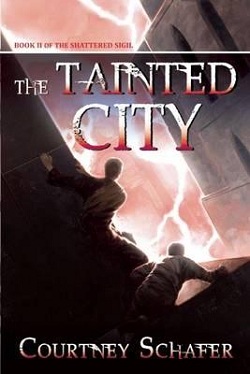You know how I got talked into reading Schafer’s debut novel, last year’s The Whitefire Crossing?
I heard it had rock climbing in it. (That’s my favourite sport at which to suck really badly.) Turned out, once it got its feet beneath it, The Whitefire Crossing was a perfectly decent first novel, showing distinct promise. So far, so good, but nothing to get excited about, right?
Well, The Tainted City, a direct sequel, is a definite improvement. In every way more robust and assured, it doubles down on grand stakes while keeping the pressure on personal ones. And yes, I’ll admit it: the tension was such that I checked the final pages in advance, to spare my stomach some clenching.
Things hadn’t gone all that well for Dev, outrider and sometime smuggler, by the end of The Whitefire Crossing. He managed to get the apprentice blood-mage Kiran away from the city of Ninavel, over the border to Alathia, and out of reach of Kiran’s former master, Ruslan – a truly nasty piece of work. But it nearly killed him. Worse, the Alathians take a dim view of smuggling and an even dimmer view of blood magic; now he’s a prisoner, hostage for Kiran’s good conduct.
Piling injury upon injury, he promised to rescue his late mentor’s daughter from the fate worse than death that awaits her when she outlives her usefulness as a child-thief, and time is running out. When the Alathians invite him and Kiran to accompany a team on a vital mission to Ninavel, to investigate the links between recent magical disturbances in the city and the problems the Alathians have been having with their famously impenetrable border wards, he leaps at the chance.
Spoilers follow.
But the offer isn’t what it seems. Once in Ninavel, Martennan, the team’s leader, betrays their trust, cutting a deal that gives Kiran back to Ruslan in exchange for permission to participate in the investigation. Ruslan screws with Kiran’s memories, making him believe he never left. Reluctantly, Dev agrees to keep working for Martennan, who offers the slender hope that the Alathians can help get Kiran away from his master once more. It will take everyone, including Ruslan, to discover who’s causing the confluence of magical energies under Ninavel to become cataclysmically unstable – and stop them before they succeed in cutting off the magical supply of water that Ninavel’s inhabitants require to keep their desert city habitable.
Oh, and prevent the girl he promised to save from being used as a hostage against him. That might be the hardest task of all.
The Tainted City is a solid piece of work. (I’m tempted to say excellent, but I’m rationing my superlatives these days.) Schafer is developing a deft hand with characterisation, setting, and action: she juggles Dev’s understandable paranoia and Kiran’s internal struggle with polish and an eye towards keeping the highest pitch of tension. There are moments where she stumbles, but they’re few and far between.
My main point of criticism rests on her choice of points of view. Both Dev and Kiran are viewpoint characters, but Dev recounts his adventures in the first person, while Kiran’s sections are told in close third person point of view. (“I watched Kiran” vs. “Kiran watched Dev.”) The transition between the two jars me out of the fictional dream every time.
I wouldn’t be me if I didn’t remark upon the female characters, especially in a novel where both our protagonists are male. There are more here, and more interesting, active ones, than in The Whitefire Crossing, although I’m a little disappointed to report that two of them (the unsympathetic ones) are characterised as using sex or its promise to manipulate the men around them, and none of the female characters are shown with strong friendships to other women. To boot, it turns out that of the pair of gay lovers which this book gives us, one is a traitor who’s prepared to see a whole city burn for the sake of principle. He’s understandably, sympathetically characterised… but still, I’m a little over-sensitized to the evil gay pattern.
Despite these flaws, it’s a good book, with a properly tense climax and a dénouement that promises more interesting things to come. Schafer’s definitely a writer to watch, and I for one look forward to doing so.
Find Liz Bourke on Twitter @hawkwing_lb, where she complains about quotidiana and Greek translations. And books, from time to time.










